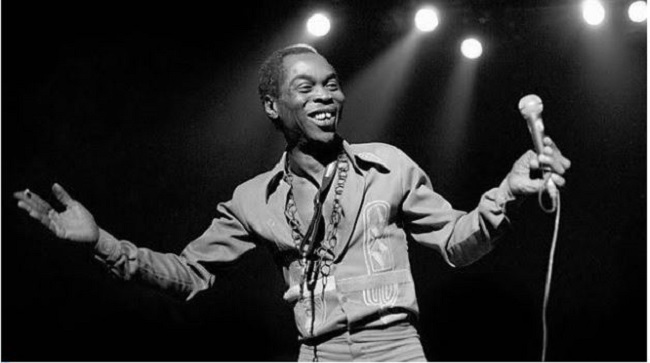Today marks 25 years since the demise of popular Afrobeat legend, Fela Anikunlapo Kuti. His family on Tuesday marked the 25th anniversary of late Afrobeat legend who died on August 2, 1997, two years before Nigeria returned to civilian government.
Remembering Fela reminds us of one of Nigeria legacies when it comes to music industry, “Afrobeat Music” a dance-protest music was inspired as a form of resistances against military dictatorship in Nigeria in the 1970s. A look into his life will give us a clear insight on how he metamorphosed Afrobeat music from a national based music to a global stage.
By calling his music “Afro-Beat,” a contraction of “African” and “Beat,” Fela was expressing his commitment to a pan-Africanist musical discourse. The music genre instills in us a sense of cultural pride, not just to Nigerians, but to the generality of Africans, and “the black race.” Even after his death in 1997, his legacy still continues, as we can see today some African artistes like his former drummer, Tony Allen, Femi Kuti and Seun Kuti. The music genre preached cultural pride and Afrocentrism.
LIFE HISTORY OF FELA ANIKULAPO KUTI
He was the son of Reverend Israel Oludotun and Mrsn.Funmilayo Ransome Kuti, a woman rights activist and politician. Fela was born on 15 October 1938 in Abeokuta, Ogun State and died on August 2, 1997. He championed the legacy of Afrobeat music, an African style of music of hybrid composition of traditional Yoruba elements and vocal styles with American funk and jazz.
During his early age, Fela’s parents were not interested in his music career, instead, they wished he would become a doctor. In order to make their aspiration for him to become a reality, Fela was sent to London in 1958 to acquire medical education, However, Fela registered at Trinity College School of Music.
Based on the essay titled Fela Kuti Chronicle of a life foretold, 1970, Fela Ransome-Kuti changed the first part of his surname Ransome to Anikulapo which means ‘I have death in my pocket’, which is to say, as he often did, ‘I will be the master of my own destiny and will decide when it is time for death to take me’. When he died in August 1997 at the age of 58, Fela appeared to fulfill the prophecy implicit in that earlier name change; and the manner of his death was as dramatic as the manner of his living.
While still in college, he formed ‘Koola Lobitos,’ his first band in London before he came back to Nigeria. In 1963,when he was back to his father’s land, he re-branded the band as a professional band, trained as a radio producer, and worked with trumpeter Victor Olaiya.
In 1967, Kuti travelled to Ghana on a tour looking for a new musical direction. During his music tour in Ghana, he met a ‘Duke’, a Ghanaian promoter and together they planned a USA music tour which eventually took place in 1969 but later turned out to be a disaster. The tour was halted as a result of failure by Duke to obtain the proper work permits for all the group’s members.
During the US tour, he recorded some of his compositions with a new group of musicians who embraced his musical vision with a high level of commitment and ability. This group was later called Nigeria 70. However, after returning to Nigeria from the US tour, the group was renamed “Africa 70”. Later on, Fela Kuti with his band changed their focus on political issues.
In 1974, Fela Kuti created a community he named the ‘Kalakuta Republic.’
In 1977, Fela alongside his group ‘Afrika ’70’, released ‘Zombie’. This album caused him some threat from the then government, which reportedly sent soldiers to attack the ‘Kalakuta Republic.’ His properties were destroyed , he was beaten, injured and his elderly mother was reportedly thrown from a window. Sadly, her mother later died due to the effect of her injuries, prompting Kuti to deliver her coffin to a Nigerian general’s residence and inspired to compose two more songs criticizing the military government in power then.
In 1979, Fela Kuti formed a political party called ‘Movement of the People’ (MOP) and declared his ambition on contesting as president in the elections on the ticket of his own party. As a response to his agitation from the government, the party was banned from contesting in Nigeria’s presidential election. Thereafter, he launched a new band named ‘Egypt ’80.’
In 1984, he was arrested for currency smuggling and jailed for 20 months, but was released from prison after the coup that ousted former Head of State, Muhammadu Buhari in 1985. His music career continued through the 1980s, performing in a notable Amnesty International concert in New Jersey and releasing ‘Beasts of No Nation’ just before the abolition of apartheid in South Africa.
In 1992, he released his final Afrobeat music album entitled ‘Underground System’. Again in 1993, he was arrested for murder after someone was killed in a fight at his Shrine. B
Fela died on 2 August 1997. Before his death, he had once said that he was suffering from Human Immunodeficiency Virus (HIV). Thousands of people gathered to pay their final respects. The funeral ceremony metamorphosed into a festival of joy and lasted for three days.
His major works including the album ‘Zombie’ (1977), The singles ‘Coffin for Head of State’ and ‘Unknown Soldier’ were written in response to his mother’s death at the hands of the military.
Fela Anikulapo Kuti would be forever remembered for his legendary personality of speaking his opinions on matters and issues that affected the growth and development of the nation through his Afrobeat music. With his Afrobeat style of music, there has been a re-awakening of spirit in the Nigeria music industry and the general culture of Africa.
ALSO READ FROM NIGERIAN TRIBUNE




